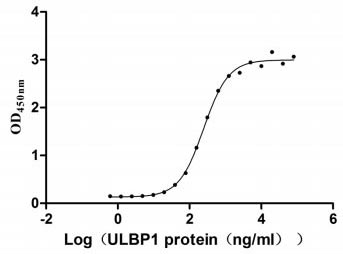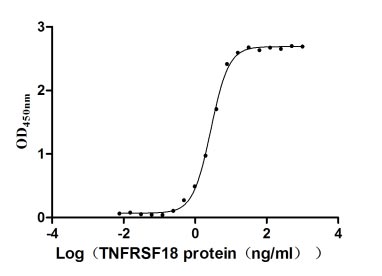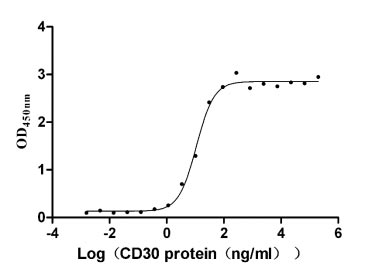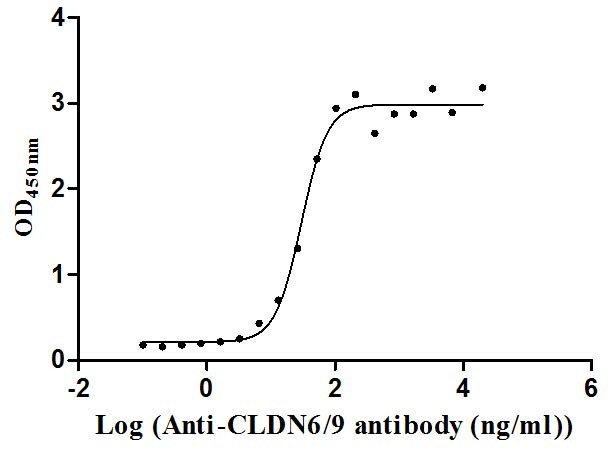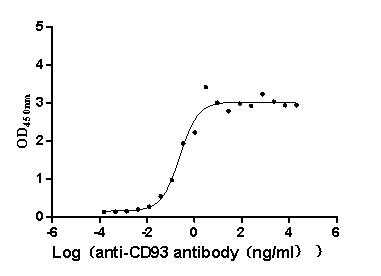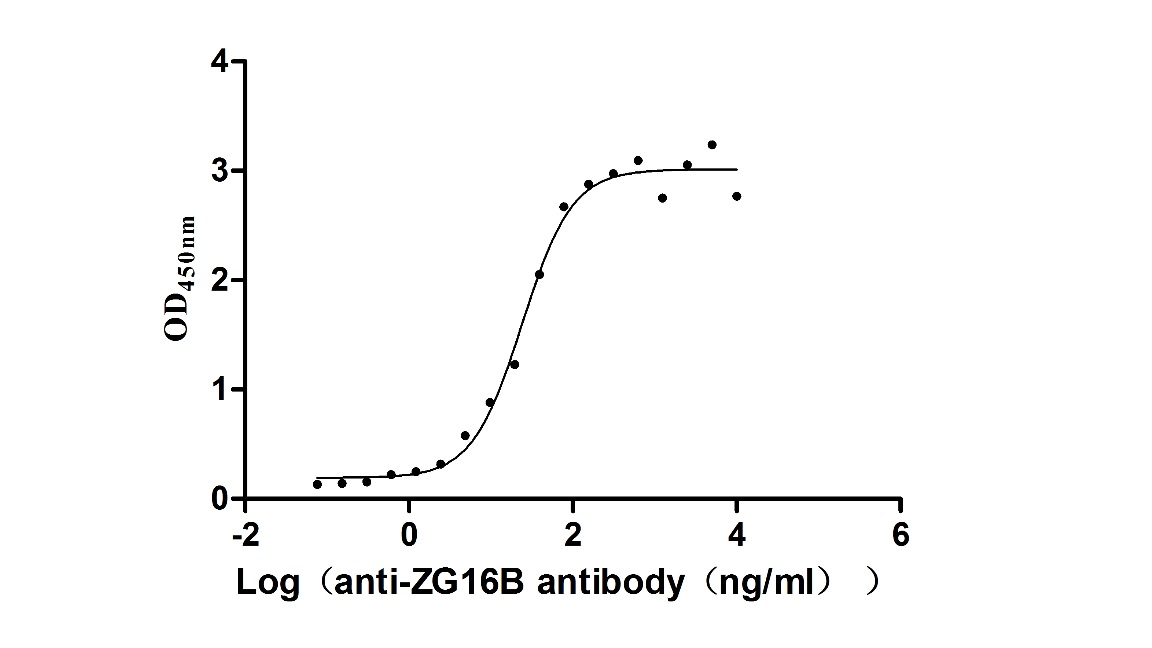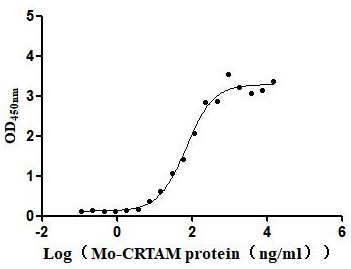Recombinant Human Protein piccolo (PCLO ACZ KIAA0559)
-
中文名稱:
-
貨號:CSB-YP2333HU
-
規格:
-
來源:Yeast
-
其他:
-
中文名稱:
-
貨號:CSB-EP2333HU
-
規格:
-
來源:E.coli
-
其他:
-
中文名稱:
-
貨號:CSB-EP2333HU-B
-
規格:
-
來源:E.coli
-
共軛:Avi-tag Biotinylated
E. coli biotin ligase (BirA) is highly specific in covalently attaching biotin to the 15 amino acid AviTag peptide. This recombinant protein was biotinylated in vivo by AviTag-BirA technology, which method is BriA catalyzes amide linkage between the biotin and the specific lysine of the AviTag.
-
其他:
-
中文名稱:
-
貨號:CSB-BP2333HU
-
規格:
-
來源:Baculovirus
-
其他:
-
中文名稱:
-
貨號:CSB-MP2333HU
-
規格:
-
來源:Mammalian cell
-
其他:
產品詳情
-
純度:>85% (SDS-PAGE)
-
基因名:PCLO
-
Uniprot No.:
-
別名:Protein piccolo; Aczonin; PCLO ACZ KIAA0559
-
種屬:Homo sapiens (Human)
-
蛋白標簽:Tag?type?will?be?determined?during?the?manufacturing?process.
The tag type will be determined during production process. If you have specified tag type, please tell us and we will develop the specified tag preferentially. -
產品提供形式:Liquid or Lyophilized powder
Note: We will preferentially ship the format that we have in stock, however, if you have any special requirement for the format, please remark your requirement when placing the order, we will prepare according to your demand. -
復溶:We recommend that this vial be briefly centrifuged prior to opening to bring the contents to the bottom. Please reconstitute protein in deionized sterile water to a concentration of 0.1-1.0 mg/mL.We recommend to add 5-50% of glycerol (final concentration) and aliquot for long-term storage at -20℃/-80℃. Our default final concentration of glycerol is 50%. Customers could use it as reference.
-
儲存條件:Store at -20°C/-80°C upon receipt, aliquoting is necessary for mutiple use. Avoid repeated freeze-thaw cycles.
-
保質期:The shelf life is related to many factors, storage state, buffer ingredients, storage temperature and the stability of the protein itself.
Generally, the shelf life of liquid form is 6 months at -20°C/-80°C. The shelf life of lyophilized form is 12 months at -20°C/-80°C. -
貨期:Delivery time may differ from different purchasing way or location, please kindly consult your local distributors for specific delivery time.Note: All of our proteins are default shipped with normal blue ice packs, if you request to ship with dry ice, please communicate with us in advance and extra fees will be charged.
-
注意事項:Repeated freezing and thawing is not recommended. Store working aliquots at 4°C for up to one week.
-
Datasheet :Please contact us to get it.
靶點詳情
-
功能:Scaffold protein of the presynaptic cytomatrix at the active zone (CAZ) which is the place in the synapse where neurotransmitter is released. After synthesis, participates in the formation of Golgi-derived membranous organelles termed Piccolo-Bassoon transport vesicles (PTVs) that are transported along axons to sites of nascent synaptic contacts. At the presynaptic active zone, regulates the spatial organization of synaptic vesicle cluster, the protein complexes that execute membrane fusion and compensatory endocytosis. Organizes as well the readily releasable pool of synaptic vesicles and safeguards a fraction of them to be not immediately available for action potential-induced release. Functions also in processes other than assembly such as the regulation of specific presynaptic protein ubiquitination by interacting with SIAH1 or the regulation of presynaptic autophagy. Mediates also synapse to nucleus communication leading to reconfiguration of gene expression by associating with the transcriptional corepressor CTBP1 and by subsequently reducing the size of its pool available for nuclear import.
-
基因功能參考文獻:
- In an analysis comparing 1,942 cases with lifetime diagnosis of MDD and 4,565 controls, PCLO showed a genome-wide significant association with major depressive disorder at SNP (rs2715157, p = 2.91 x 10-8) and gene-based (p = 1.48 x 10-7) level. PMID: 28540843
- The results showed that Piccolo, a protein that is essential in the maintenance of active zone structure, constitutes a potential serological correlate of recovery from GBS. PMID: 27776345
- we report an additional patient with the 7q21.11 deletion syndrome and provide evidence that haploinsufficiency for a single gene may not be the disease mechanism. In vitro studies of the interaction between PCLO and CACNA2D1 will be required to examine the hypothesis that combined haploinsufficiency for these two synaptic proteins results in neuronal dysfunction PMID: 28240412
- Piccolo contributes to tumor aggressiveness in esophageal squamous cell carcinoma, likely by stabilizing EGFR and promoting EGFR-dependent signaling. PMID: 28263981
- Results provide some support for the involvement of BICC1 and PCLO in late-life depressive disorders and preliminary evidence that these genetic variants may also influence brain structural volumes PMID: 26391493
- Study created and characterized a knock-in mouse model carrying the PCLO Ser to Ala missense variant rs2522833, which has shown suggestive association with major depressive disorder in human population studies PMID: 26045179
- PCLO intron rs13438494 is associated with drug abuse and contributes to the pathogenesis of psychiatric disorders via modulation of neurotransmitter turnover. PMID: 25817861
- PCLO risk allele carrying remitted depressed patients did not show more negatively biased memory than non-risk allele carriers, not even patients with stressful childhood events. PMID: 25379724
- The subsequent validation study on 68 LCBs identified recurrent mutations in TERT promoter, chromatin regulators (BAP1, PBRM1 and ARID2), a synapse organization gene (PCLO), IDH genes and KRAS. PMID: 25636086
- A homozygous, nonsense PCLO mutation underlies the autosomal recessive neurodegenerative disorder pontocerebellar hypoplasia type III. PMID: 25832664
- PCLO and CACNA1C depression risk alleles jointly affect memory-related subgenual cingulate activity. PMID: 24643163
- For neither PCLO nor GRM7 we found a more associated variant. For SLC6A4, we found a new SNP that showed a lower P-value than in the GAIN-MDD GWAS PMID: 24278217
- The results demonstrate that rs13438494 intron 24 of PCLO gene alters the splicing efficiency by creating or disrupting a splicing motif that functions by binding of the splicing regulatory protein and may ultimately influence bipolar disorder. PMID: 24167553
- The role of the PCLO risk allele on functional magnetic resonance imaging (MRI) correlates of emotional memory in a sample of 89 major depressive disorder patients, was investigated. PMID: 23620758
- Single-nucleotide polymorphism rs2522833 within the PCLO gene might increase vulnerability to major depression both by physiological and behavioral pathways. PMID: 22832399
- The PCLO risk allele was found to be specifically associated with altered emotion processing, but not with executive dysfunction. Moreover, the PCLO risk allele appears to modulate amygdala function during fearful facial processing. PMID: 22832909
- In this study, the genotype distributions and allele frequencies of PCLO rs2522833 polymorphisms were examined in 267 Japanese healthy subjects PMID: 22293360
- Piccolo transgenic mice exhibit depression-like behavior in forced swim and tail suspension tests, which may suggest that a single nucleotide polymorphism in the piccolo C2A domain may be a causal risk factor for major depression. PMID: 20980930
- In major depressive disorder genome-wide association study, best femalee-specific SNP was rs2715148 within PCLO gene PMID: 21621269
- one SNP (rs13438494), in an intron of the piccolo gene, was significantly associated with bipolar disorder PMID: 21185011
- PCLO is associated with depressive disorders in a population-based study. PMID: 19942622
- Variation within PCLO may have a modest effect on early-onset type 2 diabetes, possibly as a result of reduced insulin action, but has minimal, if any, impact on population-based risk for type 2 diabetes. PMID: 18647954
- From this GWAS results for the PCLO region were intriguing, this highly plausible hypothesis did not find support in a large-scale replication attempt. PMID: 19065144
- The PCLO/Piccolo of SNPs(rs2522833)is a potentially causal variant in a biologically plausible candidate gene, with major depressive disorder. PMID: 19546850
顯示更多
收起更多
-
相關疾病:Pontocerebellar hypoplasia 3 (PCH3)
-
亞細胞定位:Cell junction, synapse, presynaptic active zone.
-
組織特異性:Moderately expressed in the developing cerebral cortex.
-
數據庫鏈接:
Most popular with customers
-
Recombinant Human NKG2-D type II integral membrane protein (KLRK1), partial (Active)
Express system: Mammalian cell
Species: Homo sapiens (Human)
-
Recombinant Human Tumor necrosis factor receptor superfamily member 18 (TNFRSF18), partial (Active)
Express system: Mammalian cell
Species: Homo sapiens (Human)
-
Recombinant Human Tumor necrosis factor ligand superfamily member 8 (TNFSF8), partial (Active)
Express system: Mammalian cell
Species: Homo sapiens (Human)
-
Recombinant Rat Intestinal-type alkaline phosphatase 1 (Alpi) (Active)
Express system: Mammalian cell
Species: Rattus norvegicus (Rat)
-
Recombinant Human Claudin-9 (CLDN9)-VLPs (Active)
Express system: Mammalian cell
Species: Homo sapiens (Human)
-
Recombinant Macaca fascicularis CD93 molecule (CD93), partial (Active)
Express system: Mammalian cell
Species: Macaca fascicularis (Crab-eating macaque) (Cynomolgus monkey)
-
Recombinant Macaca fascicularis zymogen granule protein 16 homolog B (ZG16B) (Active)
Express system: Mammalian cell
Species: Macaca fascicularis (Crab-eating macaque) (Cynomolgus monkey)
-
Recombinant Mouse Cell adhesion molecule 1 (Cadm1), partial (Active)
Express system: Mammalian cell
Species: Mus musculus (Mouse)


